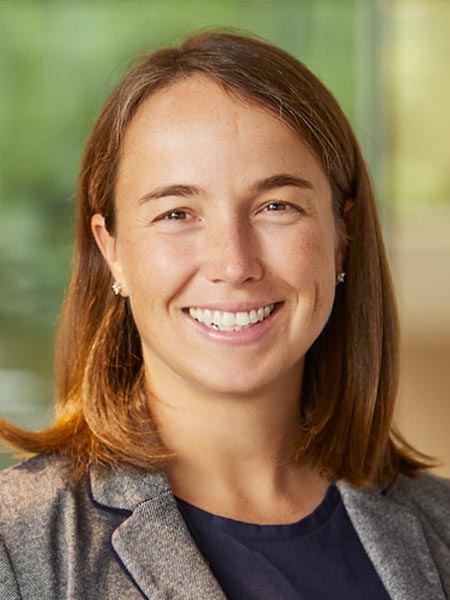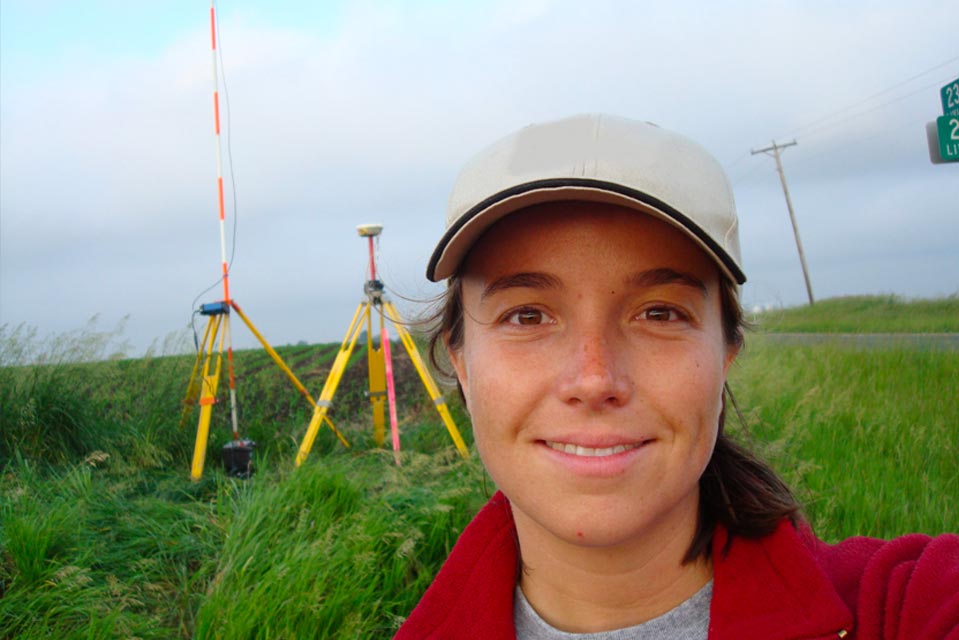
experience
Virginia Winberg is a licensed land surveyor in Minnesota, Virginia, and Kentucky. She has 16 years of experience in the land surveying profession. Winberg is currently employed at Westwood Professional Services as a survey project manager and the survey leader for the Minneapolis power division survey team. Her professional background includes preparing surveys for utility scale solar and wind farms, power delivery, and substations in both PLSS and metes/bounds states.
Winberg is passionate about promoting the land surveying profession through the Future City Competition, STEM events, high school career fairs, and any survey-related conference that will give her a free booth to demo the “sand box” and chat about land surveying. She has served as a board director for the Minnesota Society of Professional Surveyors (MSPS), participates in MSPS’ YP group and local chapters, and is currently the secretary/treasurer for the Future Surveyors Foundation.
When she is not promoting the Women Surveyors Summit, you can find Winberg gardening, sailing, or hiking in her free time.
You are very involved in mentoring initiatives within the surveying community. Tell us about the Future Surveyors Foundation and the Women Surveyors Summit.
The Future Surveyors Foundation was created out of a vision Anna Rios, president, had for unrepresented groups in the land surveying profession. It started with the first Women Surveyors Summit in 2019. Sixty-five women came together to bond over the profession and share experiences. During the last day of the event, Rios received an overwhelming amount of support for the summit to occur on an annual basis.
Today, the Future Surveyors Foundation is a 501c3 nonprofit organization. We received our nonprofit status right before COVID-19 hit the United States and a lot of our plans for the foundation had to be put on hold. Due to the uncertainty of mass gatherings in 2021 and the time it takes to plan an event, we opted for a virtual Women Surveyors Summit in July 2021.
The summit will have a two-hour session each day (total of 4 professional development hours). On the first day, Edie Harrison, a leadership training consultant, will navigate the topic of having difficult conversations. She will review how we frame the word “difficult” and discuss the types of difficult conversations we face in our careers as women in a male-dominated profession. Breakout sessions for small group discussions will dig deeper into what makes the conversation difficult and discovering the good that comes from those conversations.
On day two, we will welcome a panel of speakers from Get Kids Into Survey, NCEES, and the Future Surveyors Foundation. We will answer questions that focus on how we, as land surveyors, can promote and diversify our profession. I look forward to the participants’ questions, experiences, and suggestions on this interactive session.
Last, there will be a virtual happy hour for the participants to catch up and meet new industry experts, which is one of my favorite memories from the first event. And, to keep the event top-of-mind for the year, all participants will receive an event t-shirt with the summit logo. Please help us spread the word of this great event by telling a woman you know in the profession about the summit.
Along with the Women Surveyors Summit, the foundation will be expanding activities to support all backgrounds, regardless of race, gender, or socioeconomic status. This profession has a lot to offer all different types of people. I am excited to be a part of this foundation and its focus to support and promote diversity in the land surveying profession.
Why should other surveyors also give back?
The art of land surveying cannot be completely taught in textbooks or videos. It’s something that is developed from within based on your experiences and your mentors. When you talk to land surveyors about the profession, they will speak about their methods based on who taught them. That is the art form, weaving your personal experiences with those of your mentor.
Some of my mentors are land surveyors I met at an annual event or local chapter meeting. I’ve never worked with them. The lessons learned from them are just as valuable as those I learned from my supervisors and colleagues. That is why I think surveyors should give back to their community. You never know who you might influence.
Why is mentoring and giving back to the surveying community so important to you?
Several people in the surveying community have invested in me, enabling me to be where I am today. I am very thankful I had such great mentors. I want to return the favor, so to speak, and pass what I have learned on to the next generations.
Giving back takes time, preparation, and money, but I think the biggest hurdle for people is getting outside of their comfort zone. Once you have achieved that, the other factors are pretty minor. If you are ready to give back and don’t know where to start, let me know. I would be happy to help guide you.

Tell us about your background and how you became interested in surveying.
My degree is in geography. After I graduated, I had difficulty finding a job I liked in GIS. Because I had taken a lot of drafting classes in high school and college, I decided to apply at a land surveying company as a survey technician. Shortly after being hired, I discovered I liked land surveying and I saw potential for a career in this field.
There is a sense of adventure and mystery being a land surveyor, and that’s what drew me to the profession. I love the entire process of preparing a survey, including the hunt for monuments, the research, putting on a detective hat to solve a difficult boundary, and preparing a map to communicate your findings.
Why did you pursue getting your P.S. license, and why should other surveyors pursue professional licensure?
At one point in my career, I was able to complete all tasks that were required for a survey with the exception of signing the survey. I wasn’t satisfied with that, and I really wanted to be able to say I could do it all. That’s why I wanted to be licensed.
Licensure offers opportunity. If you want more opportunity in your career, then you need to train, study, and pass exams. Plus, being a licensed land surveyor is an in-demand position in the profession. Again, professional licensure equals more opportunity.
What advice would you give to a woman starting out in this profession?
My advice for women starting out in land surveying is the following:
- Raise your hand and ask questions.
- Make contributions to the conversation.
- Sit at the table and not in the row of extra chairs along the back of the wall.
- Find a mentor and meet regularly.
Annually, NCEES sponsors the DiscoverE Future City Competition and the surveying special award. This year, you represented NCEES as a Minnesota regional judge for the special surveying award. Tell us about your experience judging and the competition.
Being a judge for the land surveying award is an effective way to plant the seed of land surveying as a profession into the minds of 40 plus middle schoolers. The judges have 10–15 minutes to interact with each team. We introduce ourselves as land surveyors, talk to them about the type of projects we work on, and ask them how their team incorporated land surveying into their Future City.
I love to see the designs and the effort these kids have put into their project. There is no shortage of creativity. I make it a point to express to them, especially to the girls, that, yes, you can do this. You can be an engineer. You can be a land surveyor. I think it is important to hear words like that when you are young and to know that you are capable.
The time commitment is relatively short as a judge. It’s just a few hours of one day. I volunteer with a group of fellow land surveyors that I do not see very often. It is like getting the band back together each year. We catch up, talk to kids about land surveying, and marvel at the future of this young generation. It is a positive experience had by all—kids and judges alike.

